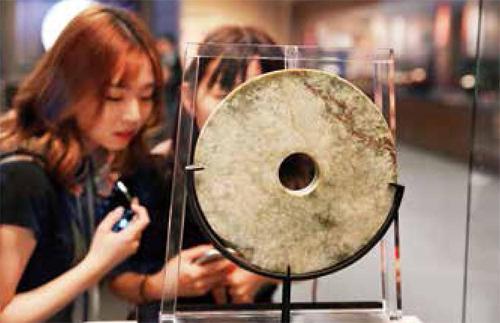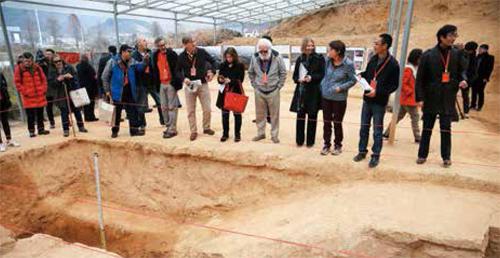一种历史,一种情怀,一种精神
2018-09-06金丹丹
金丹丹
钱塘江,是浙江的母亲河,浙江文明的摇篮。
用文化的眼光看钱塘江,它是一种历史、一种情怀、一种精神、一种价值观。
钱塘江文化该如何定义?它具有哪些内涵?在当下挖掘钱塘江文化,对浙江的发展又有什么样的指导意义?
为此,笔者采访了三位专家,谈谈他们心目中的钱塘江文化。
宋建武(中国人民大学教授、博士生导师):挖掘钱塘江文化对发展具有示范意义
在宋建武看来,钱塘江文化是把历史、现代及未来融为一体的开放的文化。它传承了中华民族的优秀文化内核,在浙江改革开放的过程中,又融入了新的内涵。
这些年,随着浙江的发展,特别是在浙江民营经济及产业发展新动能转换过程中,钱塘江文化有了“创新、进取”的新内涵。
“同时,钱塘江文化还体现了浙江人‘务实、创新的特性。浙江人在与人合作时,愿意先伸出橄榄枝,表明自己合作的诚意,以及有着善于挖掘新事物发展的眼光和承担创新代价的胸怀。”
宋建武将钱塘江文化的特质概括为“创新、诚信、务实、进取”。
“浙江能够在很多方面引领我国的区域发展,钱塘江文化堪称文化基础。”宋建武认为,挖掘钱塘江文化内核,对于理解浙江这一新时期发展样板具有很大的认识意义。“人民群众的美好生活需要更深层次的审美要素,以钱塘江文化为代表的浙江文化的发展,如果能够把文化与经济、与社会生活有机地结合,将会对满足人民群众对美好生活的需要有非常大的示范意义。”
宋建武建议,要走出一条别具特色的钱塘江流域文化产业发展之路,可以用具象的符号来体现其欣赏性、借鉴性、实用性,将钱塘江文化变成可以具体利用、欣赏的产品和服务。
“以钱塘江文化为基础,可以打造优质的旅游产品。”宋建武说,钱塘江两岸人文荟萃,有很多文化历史积淀、很多美好故事和传说,近现代历史上很多名人也在钱塘江两岸成长,这些都是很好的旅游文化资源;而近年来在浙江这片热土上成长起来的许多行业引领性企业,作为钱塘江文化的新要素,也可以成为产业旅游的目的地。
他还建议,将钱塘江流域历史与当代名人,以作品为基础,将之变成可复制的大众文化产品。“可以利用钱塘江文化面向世界、面向未来的精神,将它变为一种文化符号,注入到传统产品的开发中。”
李杰(浙江省钱塘江文化研究会副会长,浙江大学传媒与国际文化学院教授、博士生导师):愿钱塘江流域成为下一代诗意栖居地
在李杰看来,钱塘江文化是指钱塘江流域人民创造的全部精神成果及相关物质形态,包括物质层面的生产工具、特色建筑、特色工程,制度习规层面的风土人情、传统习俗,以及精神层面的宗教信仰、文学艺术、思维方式、价值观念、审美情趣、精神符号等等。
“钱塘江文化助推中国儒家文化完成了一次重大演进:发源于钱塘江上游的南孔儒学,在保持‘仁这个内在精神的同时,文化的逻辑侧重点从上层建筑的完善,转向经济建设的实效;在坚守家国情怀的同时,精神的侧重点已经从‘治民转变为‘富民,落实为兴教育、创实业、谋稻粮,开拓出知行合一、经世致用、务实求真、敢于创新的儒学新面貌。”
他认为,钱塘江文化的精神内涵有三个突出特质:勇立潮头、求实创新、互通共享。
“勇立潮头,就是钱塘江流域自古以来人、水互动形成的敢于冒险、敢于开拓的‘弄潮儿精神;求实创新是求真务实、知行合一、义利并举的南孔新儒学境界;互通共享是润泽万方、同舟共济、汇通天下的共建共享气度。”
在当今新一轮创新大潮和中华文化伟大复兴的大格局中,李杰认为,钱塘江文化可以起到“文化精神引领、文化资源开发和文化新动能”三方面的作用,“勇立潮头精神为浙江改革开放走在前列提供了精神基础;求实创新为浙江干在实处、探索和发展多种经济模式提供了社会文化心理条件;互通共享为浙江的国际贸易、互联网经济和当今的大湾区建设提供了传统文化的积累。”
从文化资源开发的角度看,钱塘江流域积累了丰富的文化资源,这些资源的发掘整理、开发利用,将为钱塘江流域文化产业的发展提供坚实的基础。
从文化新动能的角度看,钱塘江文化从来不是僵死的化石和抽象的概念,它是“流淌的智慧、勇气、热情和创造力”,而这,是一种“文化软实力”,其作用不仅表现在狭义的文化活动中,更表现在浙江经济、社会、科技、生态的改革创新中,为浙江的发展提供新动能。
“我梦想中的钱塘江建设,是以钱塘精神为主线,以文化脉络梳理为突破,文化科技创新为动力,以大河经济文化创新高地为目标,把钱塘江流域建设成为流动的历史文化长廊,人类精神创新的策源地。”李杰说,“我希望钱塘江三江两岸地区,成为人类未来城市生活的新樣板,文化精神的新样态,成为下一代钱塘人诗意栖居的地方。”
徐吉军(浙江省社会科学院历史研究所所长、研究员):“弄潮儿精神”是浙江精神的象征
“漫长历史时期里,钱塘江流域涌现出了无数的风流人物,钱塘江流域的人民在生产和生活的社会实践中创造了卓越的物质财富和精神财富,它们的总和,便是我们所说的钱塘江文化。”
徐吉军表示,如果就物质文化来说,钱塘江流域是世界上稻作农业的重要发源地之一,浙江有“鱼米之乡”的美誉;这里也是世界上桑蚕业的发源地之一,素称“丝绸之府”;这里是瓷器的发明地,唐代越窑、五代吴越国秘色瓷和南宋官窑是其代表。此外,根据考古资料,钱塘江流域还是世界上髹漆的发源地。跨湖桥遗址出土的独木舟,距今8000~7500年,是迄今我国考古所见的最早的独木舟,称为“中华第一舟”。再如以良渚玉器为代表的玉文化,以绍兴黄酒为代表的酒文化,以西湖龙井茶为代表的茶文化,以越王剑和张小泉剪刀为代表的冶铸文化,以西湖金鱼为代表的鱼文化等,都在中国物质文明史上占有非常重要的地位。
“錢塘江文化是浙江最具代表性和影响力的主体文化,是浙江文明的象征和代表,也是长江文明和中华文明的重要组成部分。”在徐吉军看来,钱塘江文化具有源远流长、博大精深、辉煌灿烂、开放程度高、创新意识浓、辐射力强等特点,钱塘江文化的精神禀赋可以概括为“奋发自强、尚文习武、爱国爱乡、苦干实干、开拓创新、追求卓越”。
“在我看来,作为钱塘江文化的重要内核和特色的‘弄潮儿精神,既体现了中国的文化担当、文化智慧,也是浙江精神的象征。”他认为,挖掘钱塘江文化,特别是其中的精神文化,对浙江及钱塘江流域各地具有极其重要的历史意义和现实指导意义。
徐吉军说,钱塘江虽然规模不及长江、黄河,但自古以来,它就是一条文化之河,文学、艺术、哲学、史学、宗教等极其发达,对海内外具有极其重大的影响。“今天,我们要以‘干在实处、走在前列、勇立潮头的开拓创新精神,续写追求卓越的文化特质,承担向全世界展示中国方案、中国道路、中国智慧之鲜活样本的崇高使命,为中国的明天贡献更多的实践、素材、经验。”
A Humanistic Perspective
“Qiantang River Culture” through the Eyes of Experts
By Jin Dandan
The Qiantang River is the “mother river” of Zhejiang province, and is regarded the “cradle” of Zhejiang civilization. Seen from a cultural perspective, the river is a historical symbol, encapsulating enormous value, sentiments and spirit that take a humanistic perspective to define.
The following is a summary of interviews about “Qiantang River Culture” with Song Jianwu (Professor and Doctoral Supervisor, Renmin University of China), Li Jie (Vice Chair of the Qiantang River Culture Research Institute of Zhejiang Province, Professor and Doctoral Supervisor at the School of Media and Communications and International Culture, Zhejiang University), and Xu Jijun (Chair and Researcher of the History Institute of Zhejiang Academy of Social Sciences).
Song Jianwu: On the Exemplary Implications of the Qiantang River to the Overall Development of Zhejiang Province
The Qiantang River Culture is characteristically open and permissive, embracing the past, present and future. It combines the essence of the Chinese national culture with the new connotations of the open-up and reform of the province.
The substantial progresses achieved by the province in its private economy in recent years infused new blood into the Qiantang River Culture, bringing the culture into a new realm of “enterprise and innovation”.
The Qiantang River Culture is also a reflection of the down-to-earth and creativity of Zhejiang people, who are always ready to offer their sincerity, to share foresights and to take responsibilities,” said the professor, adding that “with such a powerful cultural cornerstone, the province has what it takes to be a regional leader. The special features of the culture should also serve as unique resources for tourism development.
It is important to make the best of the cultural richness of the Qiantang River to further boost the provinces cultural undertakings. There is a lot more to explore to make the ‘culture more tangible and operational. The history of the Qiantang River, together with all the cultural notables nurtured by the ‘mother river, can be transformed into todays cultural industries.
Li Jie: Qiantang: A Poetic Human Settlement
The Qiantang River Culture is the crystallization of all the material, cultural and spiritual accomplishments of the people living in the region. It includes everything from the means of production to religious faiths, aesthetic tastes and mode of thinking.
The Qiantang River Culture played a crucial role in the evolution of the countrys Confucian civilization. The southern sect that originated from the upper reaches of the Qiantang River enriched the Confucian philosophy with pragmatic elements that blossomed into new achievements in people-oriented undertakings such as education and agricultural innovation. In this sense, the three most striking features of the Qiantang River Culture are “pioneering, innovative, sharing”.
The long-time human-river interaction fostered generations of wave riders who are fearless, truth-seeking, down-to-earth and willing to share and offer a helping hand. In the new era of cultural renaissance and industrial innovation, the Qiantang River Culture is wielding new magic in the provinces cultural pursuits. The three features of the culture ensure the right mentality for the province to break new grounds in its social and economic explorations and in its international trade and “Greater Bay” construction.
From a cultural perspective, the unique cultural riches of the Qiantang River surely serve as a solid foundation of the provinces cultural industries. The Qiantang River Culture has never been a fossilized concept; it is as flexible as the water that surges with wisdom, courage, passion and ingenuity. So it is the “soft power” in the real sense of the word.
Xu Jijun: Zhejiang Spirit: The Waverider
All the material and spiritual wealth achieved by the cultural notables and the movers and shakers, fostered by the tides of the Qiantang River, constitute what we call the ‘Qiantang River Culture today.
The Qiantang River is one of the key seedbeds of the worlds paddy agriculture. Dubbed ‘the land of silk, fish and rice, Zhejiang is one of the birthplaces of the worlds sericulture and is the inventor of porcelain and lacquering. The magnificent Qiantang River Culture is illustrated in the 8000-year-old dugout canoe, the earliest canoe found in Asia, found by archaeologists in Kuahuqiao, and by the jade artifacts from the Liangzhu relics in Yuhang. The Qiantang River Culture also boasts the rice wine culture of Shaoxing, the Longjing Tea glory and sword-making craftsmanship from Hangzhou.
The Qiantang River Culture is the host culture of Zhejiang Province, and is a symbol of Zhejiang civilization. It is also an important part of the Yangtze River civilization and the Chinese civilization. It is a pathfinder and groundbreaker that has inspired the province throughout its history. It is ‘a river of culture, with radiating power reaching foreign lands.
